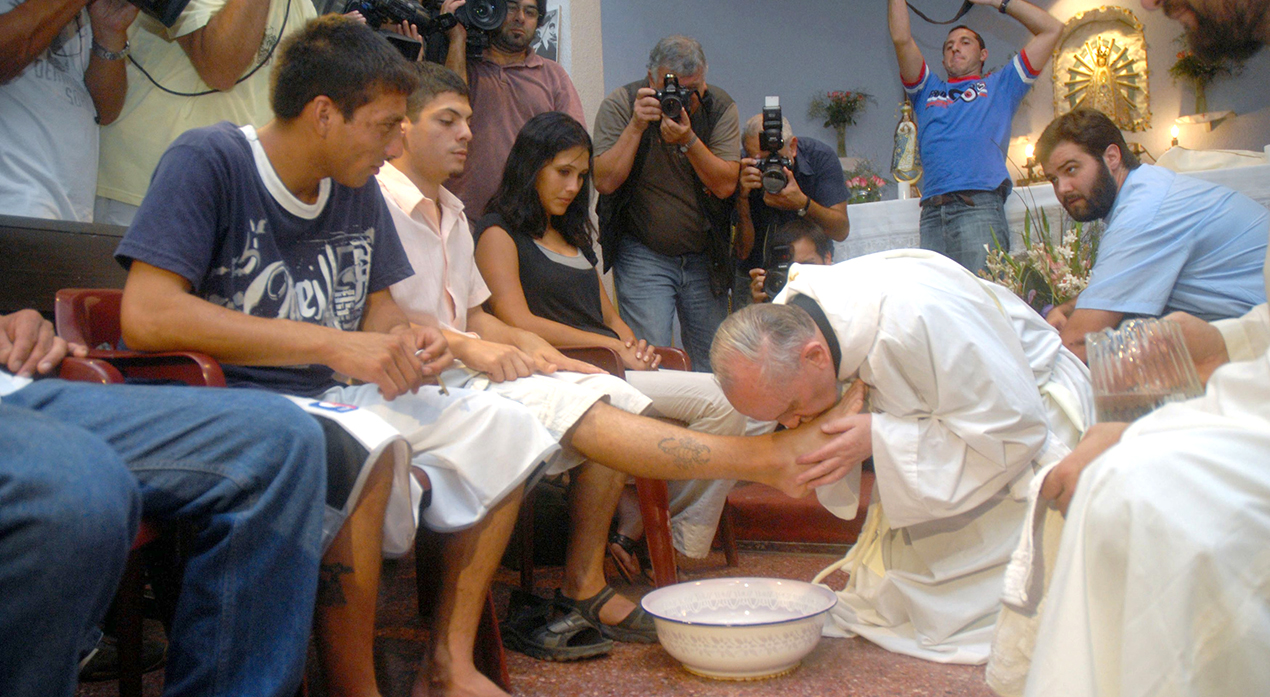Holy Thursday 2022 The Washing of the Feet: As I have done for you . . . .

We are celebrating today the Mass of the Lord’s Supper, Holy Thursday. This celebration is about service, in ordinary and daily ways.
Several years ago, I walked the famous Camino de Santiago de Compostela across the north of Spain. After a full day of being confined by hiking boots and having tired feet, I got into the habit of soaking and massaging my feet most evenings.
That was practical, even necessary, if my feet were going to take me over the next day’s route. That’s why the washing of feet made sense in Jesus’ time. It was practical. He and his disciples would have followed the tradition of washing one’s feet at the end of the day. The water removed the day’s dirt and soothed sore feet.
A host was expected to provide such cleansing for guests. The actual task usually fell to a servant. But Jesus broke with tradition by washing his disciples’ feet at the Last Supper. Here was a host breaking with tradition. The leader became the servant.
This foot washing is detailed in today’s Gospel from John 13. Those who preside at the Mass of the Lord’s Supper re-enact this each year. Pope Francis is famous for breaking tradition and washing the feet of women and non-Christians, not just twelve devout males.
Many people regard foot washing as sacramental, in that it is an outward and visible sign of inward and spiritual divine grace. We are turning a relatively ordinary everyday activity into something that opens us to a deeper reality in life, namely, the power of service. One spiritual writer refers to the sacrament of the present moment, in this case, the present moment being the washing of feet. Dirty, gnarled feet!
After Jesus washes the feet of his disciples, he says, If I, your Lord and Teacher, have washed your feet, you also ought to wash one another’s feet. For I have set you an example, that you also should do as I have done to you. Of course, the point isn’t about washing the feet of one another. It’s about service.
Service takes many forms. It means being present to another in such a way that I anticipate their needs. It means being available for the help that is needed in any setting in which I find myself. It’s about not being afraid or reluctant to do something, even if it’s somebody else’s job, such as cleaning up a mess.
Holy Thursday is a celebration of service, service to one another that sometimes takes humble forms, such as washing the feet of another. I’ve presided at the Mass of the Lord’s Supper many times, and it always feels humbling to wash the feet of others. But I know it also feels humbling to have my own feet washed by another.
I’ve had the experience of a major illness and I’ve had to rely on someone helping with ordinary activities – eating, bathing, walking and so on. It’s humbling! I’ve also been with many people who are very sick or dying.
I’m not sure what’s more humbling, to be the sick person who is dependent upon another, or to have to help with the bodily functions of the other. We can be bored or repulsed by these experiences. Or we can allow them to be a means of grace, calling us to be closer to God. Holy
Thursday is a celebration of turning those ordinary forms of service, hospitality and availability, into a way to imitate Christ.




Vicky Chen
Posted at 07:20h, 14 April‘Many people regard foot washing as sacramental, in that it is an outward and visible sign of inward and spiritual divine grace.’
I grew up as a convert studing the ‘Baltimore Catechism’. Besides the Eucharist, this ‘sacramental’ is the only one institued by Jesus Christ. (Jh 13:12-15). I often wonder why it is not also a sacrament.
Peter Bisson
Posted at 09:29h, 14 AprilThank you Philip!
Jenny Cafiso
Posted at 09:57h, 14 Aprilthank you Philip for helping me find a deeper meaning in my ordinary experiences of serving and being served — both experiences of grace.
Dodzi Amemado
Posted at 13:12h, 15 April“We can be bored or repulsed by these experiences. Or we can allow them to be a means of grace, calling us to be closer to God.”
Thank you, Fr. Philip!